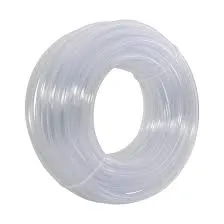Жов . 12, 2024 19:53 Back to list
8 Inch PVC Irrigation Pipe for Efficient Water Management in Agriculture and Landscaping
Understanding 8% 20 Inch PVC Irrigation Pipe A Key Component in Modern Agriculture
Irrigation plays a crucial role in agriculture, especially in regions where water resources are limited or inconsistent. Among the various materials used in irrigation systems, PVC (Polyvinyl Chloride) pipes have emerged as a popular choice due to their durability, cost-effectiveness, and ease of installation. In this article, we will explore the significance of the 8% 20 inch PVC irrigation pipe, its benefits, applications, and considerations for use in agricultural settings.
What is PVC Irrigation Pipe?
PVC irrigation pipes are made from polyvinyl chloride, a type of plastic that is widely recognized for its strength and resistance to corrosion. The 20 inch measurement refers to the nominal diameter of the pipe, making it suitable for handling significant volumes of water. The 8% likely indicates the pressure rating or the specifications regarding the pipe's capacity to handle normal irrigation requirements.
Advantages of 8% 20 Inch PVC Irrigation Pipe
1. Durability PVC is resistant to many chemicals and does not rust or corrode. This makes it an excellent choice for irrigation systems that operate over long periods and under various environmental conditions.
2. Lightweight Compared to traditional metal pipes, PVC pipes are significantly lighter, which simplifies transportation and installation. This lightweight nature also reduces the overall labor costs associated with setting up irrigation systems.
3. Cost-Effective PVC pipes generally have a lower initial cost than other materials. In the long run, their resistance to wear and tear translates to lower maintenance costs, making them a financially viable option for many farmers.
4. Easy Installation PVC irrigation pipes can be easily cut, joined, and modified, allowing for quick setup and adaptability to different field layouts and irrigation designs. This ease of installation also enables farmers to implement systems rapidly, crucial during planting seasons.
5. Versatility The 20-inch diameter allows for a wide range of applications, from large-scale agriculture to landscaping and garden irrigation. This versatility makes PVC pipes a favorite among farmers, landscapers, and garden enthusiasts alike.
Applications in Agriculture
8 inch pvc irrigation pipe

The 8% 20 inch PVC irrigation pipe is predominantly used in drip irrigation systems, sprinkler irrigation, and other forms of efficient water delivery systems. In large-scale agricultural operations, these pipes can transport water from sources, such as rivers, lakes, or wells, directly to the fields. This efficient water distribution minimizes water wastage and ensures that crops receive the necessary hydration.
Furthermore, these pipes can be integrated into advanced irrigation systems that utilize technology to monitor soil moisture levels, automate watering schedules, and conserve water resources. As agriculture becomes increasingly reliant on smart technology, the demand for reliable and efficient irrigation components like the 8% 20 inch PVC pipe will continue to grow.
Considerations for Use
While PVC irrigation pipes offer numerous advantages, farmers should consider a few factors before installation
1. Pressure Ratings Understanding the pressure ratings and the specific demands of the irrigation system is essential. Ensure that the selected pipe can handle the required pressure without risk of failure.
2. Soil Compatibility Different soil types may require different irrigation approaches. Ensure the chosen pipe can effectively deliver water as per the specific crop and soil requirements.
3. UV Resistance If used above ground, PVC pipes should be UV resistant or covered to prevent degradation from sunlight exposure.
4. Regulatory Compliance Farmers should also ensure that their irrigation systems comply with local regulations and standards for water usage and environmental conservation.
Conclusion
The 8% 20 inch PVC irrigation pipe is undoubtedly an essential component of modern agricultural practices. Its numerous benefits, including durability, cost-effectiveness, and ease of use, make it an attractive choice for farmers aiming to optimize their irrigation systems. As agriculture continues to evolve, embracing sustainable practices and efficient resource management, the role of PVC pipes will likely expand, supporting the needs of the industry in a changing climate.
-
Durable PVC-M Water Supply Pipes | 60-Year Life
NewsAug.04,2025
-
Premium HDPE Water Supply Pipes: Durable & Leak-Proof
NewsAug.03,2025
-
Premium PVC-M Water Supply Pipe - Durable & Efficient
NewsAug.02,2025
-
Premium PP Welding Rod: GPT-4 Turbo Enhanced
NewsAug.01,2025
-
HDPE Drainage & Irrigation Pipe - Durable, Efficient Solutions
NewsAug.01,2025
-
Premium PVC Transparent Pipe: Durable & Clear Solutions
NewsJul.31,2025

